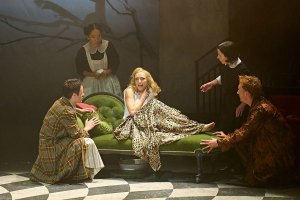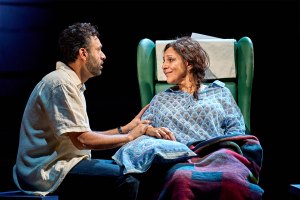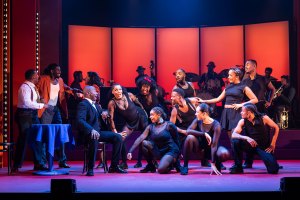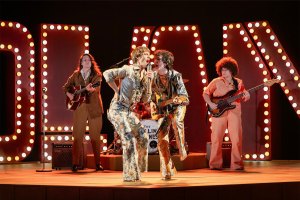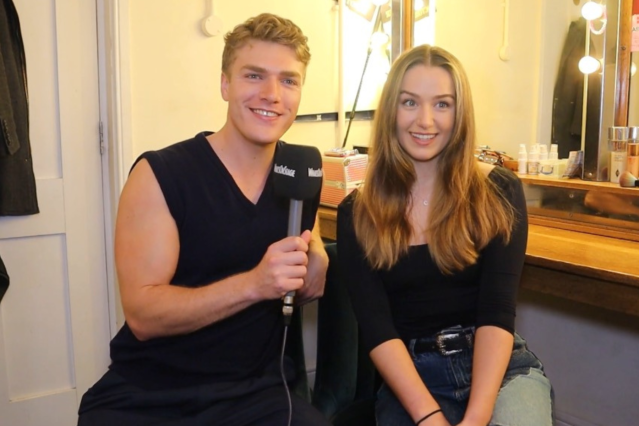”The Glass Menagerie” at Royal Exchange Theatre – review
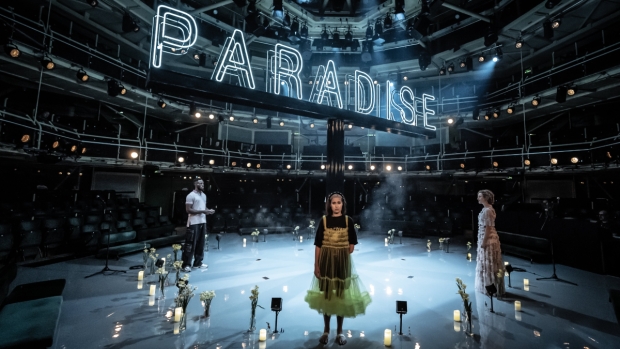
© Marc Brenner
Is there a better theatre for this play than the glass marvel of the Royal Exchange, with window walls slanting and sloping to encase its stage in a dome? It seems perfect for Tennessee Williams’ play about two forlorn children trying to escape a home made suffocating by their harrying mother.
The story is refracted through son Tom’s memories, narrating this window into his family’s tensions. His first move is to set the clock back. He sends the word ‘Paradise’ – towering above the stage as the name of the local dance hall and a fate that’s always out of reach – spinning anti-clockwise. It continues throughout almost the rest of the play, with the cast moving backwards or forwards around the circular stage, both chasing each other and trying to outrun the clock. Tom describes a character as “defeating the law of gravity”, and his mother Amanda’s constant calling back of her past seems about reversing the law of time.
The effect on her children’s lives is shown through concentric revolutions in their movement, as if whirling in her vortex. When Amanda prepares daughter Laura for a “gentleman caller”, she sends her spinning in a pirouette. Calling her “young lady” with a look of whimsical admiration, Geraldine Somerville subtly suggests she’s also, for a moment, watching herself dance in her youth at the cusp of womanhood. Memories transport as a way of enduring the present by pedalling back into the past.
As Amanda, Somerville captures the irony of a mother who lambasts her son’s obsession with the illusion and deception of films and magic, while performing her own self-deception by trying to complete her thwarted romance through her daughter. She makes her pitifully deluded while being overbearing, pointing her finger like the hands of a clock. Her voice is shrill and high-pitched, often bursting into sing-song, but also draws out vowels like the long stretches of time passing them by.
Rhiannon Clements’ Laura shares her mother’s frowning or furrowed brows. Demure and timorously voiced, she’s barefoot and almost tiptoes across the stage, but offers little characterisation beyond shyness. We feel the desperation for the relief promised by the arrival of potential suitor, Jim, and Eloka Ivo brings a buoyant forward energy. Against their stiffness, his body is malleable, swaggering loosely around the stage and at one point throwing out his arms to reveal an albatross-like wingspan. He notices the vastness of his shadow, but appears incandescent enough to irradiate their gloom.
If some of the design is equally guilty of Tom’s admission about the play’s indulgence in symbolism – the giant ‘Paradise’ feels a little heavy-handed – Rosanna Vize’s set has real beauty. Its deftest touch is avoiding a hulking piece of set for Laura’s glass collection. Instead, the glossy sheen of the polished floor, glinting like the surface of a millpond, shows reflections of the characters to suggest they are those glass creatures. Peppered with reflected spots of light like a flickering constellation, it also creates a visual sense of dreams, fantasy and their wistful references to the moon and outer space.
The play is a slow-burn mood piece, but Atri Banerjee’s production occasionally feels directionless and allows the drowsy energy to overtake. To stress their distance and loneliness, arguments and flirtations are blocked with gaping space between the characters, so some of the mounting emotional devastation dissipates. It softens the gut punch of the experience we share with the characters of waiting for something that, when it finally arrives, doesn’t fulfil its promise of changing their circumstances. It leads nowhere, just as Lee Curran’s orange lights fire up and fizzle out. There’s an ornamental beauty to this production but a lack of fragility to the performances, so you never quite believe they could shatter.




